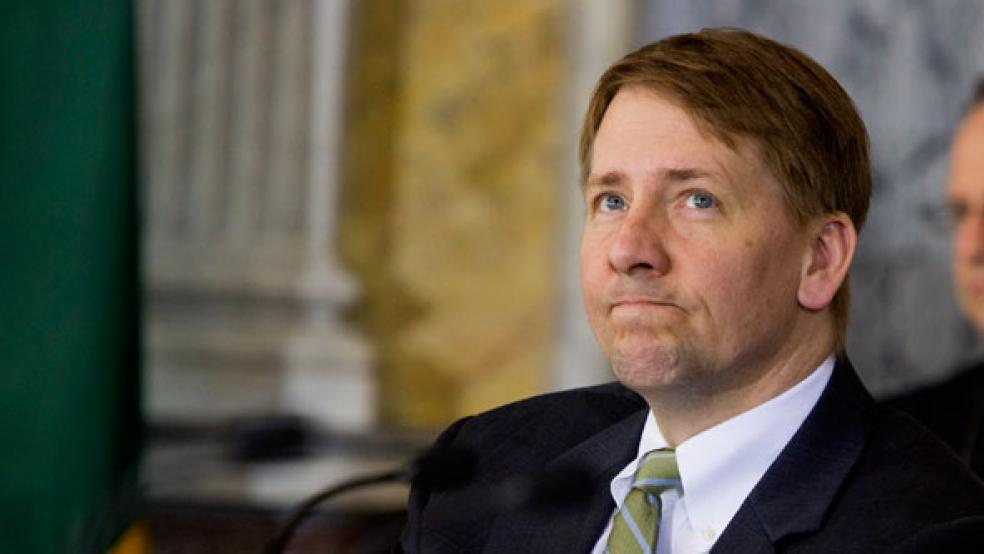The Consumer Financial Protection Bureau (CFPB) seems to be damned if it does, and damned if it doesn’t, judging by the tangled treatment it’s gotten from certain segments of Congress.

On Tuesday CFPB director Richard Cordray appeared before the Senate Banking Committee to present the semi-annual report from the watchdog agency, which was established by the 2010 Dodd-Frank financial regulatory overhaul. It wasn’t as simple as a mere presentation, however.
In shortly more than a year with Cordray at the helm, the CFPB has fined credit card companies almost half a billion dollars, set up a complaint database that has received 91,000 messages last year, and put together a student loan calculator. But the agency still finds itself getting raked over the coals by the GOP.
President Obama’s recess appointment of Cordray last year could soon be nullified by the Supreme Court, as a lower federal court has ruled that the Senate was technically still in session when the White House made him director.
At the same time, the start of the 113th Congress means that Cordray must again go through a brutal confirmation process because Senate Republicans are dead set on revamping the structure of the bureau. And the CFPB now finds itself under attack for mining big data--buying anonymous information about how 10 million Americans manage their mortgages, credit cards, and checking accounts. In the past, questions were raised about whether a national housing database would infringe on people’s privacy.
“The bureau was founded with a mission to watch out for American consumers, not to watch them,” said Idaho Sen. Mike Crapo, the committee’s ranking Republican, in a statement that called for replacing the sole directorship of the CFPB with a board and funding the agency through congressional appropriations, instead of by the Federal Reserve.
Crapo ended the hearing by reading passages from Dodd-Frank, suggesting the law forbid the acquisition of financial information without the consent of individual consumers.
But the paradox is that for the CFPB to be successful, it must understand basic trends in the consumer, housing, and lending markets. Ineffective oversight contributed to the reckless lending and housing bubble that sparked the 2008 financial crisis.
Cordray explained that the data was anonymous, so people’s privacy is safeguarded. “We have no interest in watching consumers,” he said. “We do have an interest in how financial products and services are affecting consumers.”
More importantly, the government should be able to see consumer finances with the same kind of precision as the industry, Cordray argued, saying, “The big banks know more about you than you know about yourself.”
And without reliable information, the bureau would be more likely to introduce regulations that are either flawed or impose burdensome costs on banks, credit unions, and lenders. Crapo noted that in January alone the CFPB finalized 2,500 pages of rules on mortgages without – in his opinion – “strong” cost-benefit analysis.
Cordray responded, “You want us to do careful cost-benefit analysis. We can’t do that without good data.”
Sen. Elizabeth Warren, D-Mass., defended the bureau she helped build while serving in the Obama administration, saying the critiques were a partisan smokescreen. GOP senators are “determined to hold your nomination hostage,” Warren told Cordray.
“This is about a minority that doesn’t want a watchdog that will keep an eye on big banks, to make sure they don’t cheat their customers,” Warren said.
Republicans insist their objections are about accountability.Along with Cordray, Obama appointed three members to the National Labor Relations Board in January, 2012. A federal appeals court ruled this year that the NLRB appointments were unconstitutional because the Senate continued to hold pro-forma sessions.
The ruling sets the stage for a Supreme Court decision that Senate Minority Leader Mitch McConnell, R-Ky., expects will invalidate Cordray’s appointment and the CFPB regulations introduced during his tenure. House Financial Services Committee Chairman Jeb Hensarling, R-Tx., has said his panel “cannot legally accept” Cordray as a witness for the time being.
By bringing the CFPB under greater congressional control through funding by appropriations and a board-based structure, Crapo, Sen. Richard Shelby, R-Ala., and other GOP lawmakers believe the bureau will be more responsive in addressing their concerns about the acquisition of consumer data.
Senate Banking Committee Chairman Tim Johnson, D-SD, noted that the CFPB has been communicative with Congress, with officials appearing at 32 hearings over two years, including 13 stints as a witness by Cordray.
Crapo poured cold water on that counter-argument, if not the substantive value of congressional hearings themselves. “While this gives Congress an opportunity to hear directly from agency officials,” he said, “it really fails to facilitate an in-depth discussion of specific issues or concerns.”




